
| |
| Home |
| 2025 Memorial Sites |
| Registration |
| Rider List |
| RULES and FAQs |
| Additional Rides |
| TOH Store |
| Archived Memorials |
| WELCOME! Banners |
| Donate |
| Contact Us |
Searching for the Lost Generation |
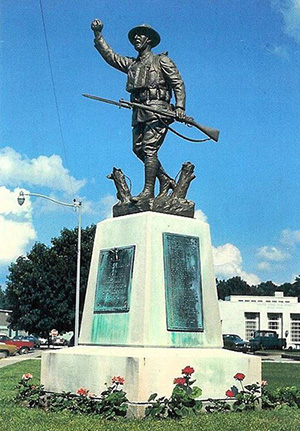 |
On April 6th, 1917, the United States ended its neutrality and formally entered the "Great War," World War I, to fight alongside European Allies until the end of the war on November 11th, 1918. During this period of time, American Army soldiers and Marines were known as "Doughboys." The term is often explained as coming about during the Mexican-American war after observers noticed US infantry forces were constantly covered with chalky dust from marching through the dry terrain of Northern Mexico, giving the men the appearance of unbaked dough. After the Great War, writers Earnest Hemingway, himself a WWI Vet, and his mentor Gertrude Stein coined "the Lost Generation" to describe the boys who had come of age and fought during the World War and the effect it had on them when they returned to normal life after the hostilities ended. So horrific were the battle scars, WWI became hopefully referred to as "The War to End All Wars." The memorial statue of the World War I American infantryman is one of the most reproduced life-size sculptures in the United States. It's proper name is “Spirit of The American Doughboy,” and the original sculptor was Ernest Moore “Dick” Viquesney (EMV), a son and grandson of French immigrant sculptors. In total, including originals made in Viquesney’s lifetime, replacements of originals, copies, those in storage, etc., about 140 are known to be standing in courthouse lawns, town squares, parks, cemeteries, and other locations, and in storage, all across America. Very few local residents in most of its locations know its full proper name or the name of its sculptor. In most locations, it’s merely called “The Doughboy” or “Our Doughboy.” Still, it’s the focal point of over ten percent of the World War I memorials in the U. S., exclusive of plaque memorials. Most Viquesney Doughboys have an ID, either as a small plate attached to the base near the right foot (sometimes missing since it was welded on separately) on the original 1920 copper models. They can vary slightly in size, shape and design. A large ID is found on the back of the base of later 1934 zinc models. These are part of the cast base and aren't removable. The rare stone ones should say 1922 by the left foot, and it's carved into the base, so it's not removable either. The ID on the 1920 version sometimes says "Americus, Georgia" and sometimes "Spencer, Ind.", but all should have a name (if it didn't fall off as described above). A few of the 1920 plates say Walter Rylander, who owned the company for a few years. Others say "Friedley-Voshardt" (the name of the foundry).
|
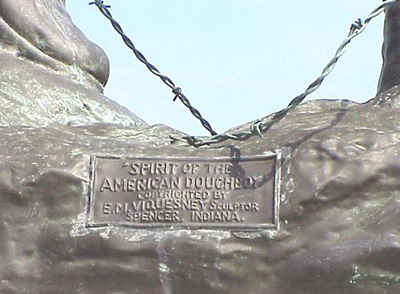 |
|
There are lots of lookalikes that don't have any ID markings at all. Every Viquesney "Spirit of the American Doughboy" holds a grenade overhead in its right hand, but that doesn't mean if it has a grenade, it's automatically a Viquesney; some other WWI statues do, too, some tossing it underhand (but EMV's "Spirit of the Fighting Yank" from WWII does have an underhand grenade throwing pose). Both the metal versions (1920 and 1934) have two tree stumps on the base, but the stone version only has one large one running up the back. The 1934 tree stumps are much shorter than the 1920 ones. The only Paulding [another sculptor of Doughboys] statues with the rifle in the opposite (right) hand are the ones in Astoria, OR, and Catskill, NY; all the others of Paulding's "Over the Top" series look similar to Viquesney's statue (which is why some people get them confused). The Paulding 'Over the Top' statues are cast bronze and have a cartouche with J. Paulding, Sc. and a date of 1920 or 1921, and AABF (or American Art Bronze Foundry spelled out) on the base. The right foot is always clear of the base and is supported by a single brace resembling a tree stump.” It is not known if all Doughboy statues are logged and, on occasion, some are brought out of mothballs. If you locate an unlisted E.M. Viquesney (EMV) statue, one not featured on the Tour of Honor website, please bring it to the scorers attention. Of special interest are: Any EMV Doughboy not on the list, especially in the states of CA, DE, LA, ND, NH, NM, NV, OR, and RI. In 1937, EMV claimed that at least one of his "Spirit of the American Doughboy" statues could be found in every state of the union but none has ever been found in the above nine states or any record of there ever being one. Some people believe that, except for the Statue of Liberty, its publicly displayed replications are collectively the “most seen” sculpture in the country. If you’d like to learn even more about the Doughboy statues, visit the Doughboy Searcher website. You’ll run across such discussions like this one about the differences between Viquesney and the Paulding statues. From Les Kopel, webmaster. Special thanks to Les Kopel of Oxnard, California, and Earl Goldsmith of The Woodlands, Texas for their website The E.M. Viquesney Doughboy Database and all their help and dedication to keeping the search alive. Well done, gentlemen!
|
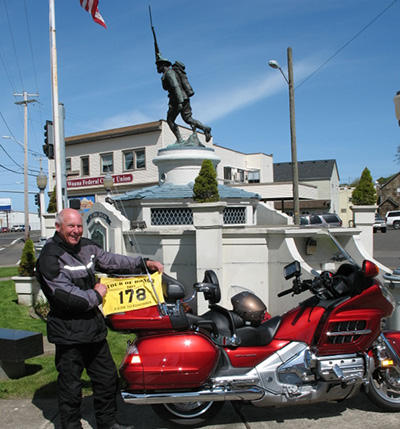 |
|
The people at the doughboysearcher.weebly.com must verify any claims of finding unknown EMV statues for credit to be awarded. To help identify a true EMV Doughboy statue, please visit here. We want to help our friends there complete their list of all EMV statuary. |
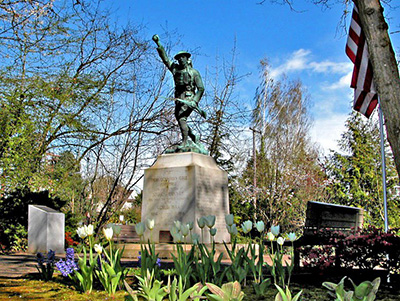 |
|
There will be three basic levels of finishers:
Bronze Level Finisher - 10 or more different Doughboys verified Highly motivated riders can reach an even higher level: The challenge is to collect pictures of WWI Doughboy statues, mainly focused on finding E.M. Viquesney's WWI themed statues. However, any other Doughboy Statue by another artist will be accepted for the purpose of the competition, as long as it's two or more feet tall. Each submission should clearly show... IMPORTANT: When it is not possible to include your motorcycle with the memorial in a single photo for any reason, include a 2nd photo with your motorcycle and rally flag parked in nearby designated parking. *PARKING or RIDING on sidewalks or lawns is not permitted unless specifically authorized by local law enforcement or memorial caretakers. TOH scorers will have final say whether a site is allowed or not. |
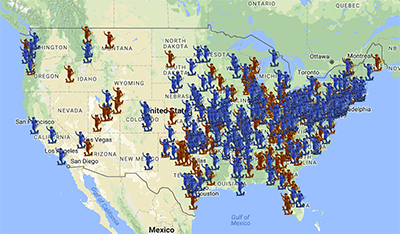
|
|
Click on the map above for an interactive map of known EMV Doughboys. Click here for a GPX file (rev. 7/21/25), and an up-to-date listing by state here. The map and GPX file are provided by scorer Eric Marshall. For corrections, updates and/or additions, let Eric or Marlisa know at photos@tourofhonor.com By definition, "statue" refers to any figure more than two feet tall. Mannequins in WWI attire, paperweights and lamps are not eligible. NOTE: The list mentioned above has a column labeled “Restrictions.” Any locations labeled something other than “none” may have a restriction of some kind. Examples would include, but not be limited to: military installations, museums, offices, cemeteries, etc. These may be accessible only on certain days, have limited hours, require a special ID or guest pass, have an admission fee, etc. It is up to riders to pre-scout locations to determine access.Photos of museum doors, hangars, guard shacks or other barricades visited on days or during hours when access to the object of the visit isn't available, are not eligible for scoring. |
|
|||||||
| Ask about being a sponsor | |||||||

|



